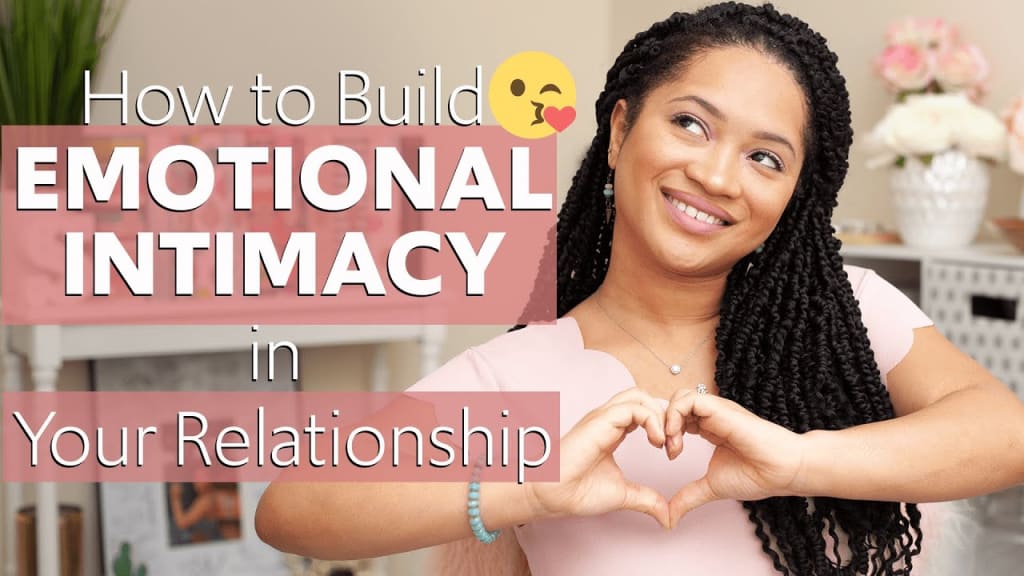How to Build Emotional Intimacy in Your Relationship!
Intimacy is a fundamental aspect of any healthy relationship. It can refer to the emotional, physical, intellectual, or spiritual connection between two people. Intimacy allows us to feel seen, heard, and valued by our partners, and it creates a sense of closeness that can strengthen our bond. However, building and maintaining intimacy can be challenging, especially in the face of stress, conflict, or busy schedules.

Outlines.
I. Introduction
Definition of intimacy
Importance of intimacy in relationships
Purpose of the e-book
II. Types of Intimacy
Emotional intimacy
Physical intimacy
Intellectual intimacy
Spiritual intimacy
III. Building Intimacy in Relationships
Communication
Trust
Vulnerability
Quality time
Affection and appreciation
IV. Common Challenges to Intimacy
Stress and busyness
Technology and social media
Infidelity and betrayal
Trauma and past hurts
V. Overcoming Challenges to Intimacy
Self-awareness and self-care
Couple therapy and counseling
Forgiveness and reconciliation
Boundaries and balance
VI. Enhancing Intimacy in Different Stages of a Relationship
Dating and courtship
Marriage and long-term commitment
Parenthood and family life
Aging and retirement
VII. Conclusion
Summary of key points
Call to action for readers to prioritize intimacy in their relationships
Additional resources and references
Introduction:
Intimacy is a fundamental aspect of any healthy relationship. It can refer to the emotional, physical, intellectual, or spiritual connection between two people. Intimacy allows us to feel seen, heard, and valued by our partners, and it creates a sense of closeness that can strengthen our bond. However, building and maintaining intimacy can be challenging, especially in the face of stress, conflict, or busy schedules. This e-book aims to explore the different types of intimacy, provide practical strategies for building and enhancing intimacy in relationships, and address common challenges that can hinder intimacy. Whether you're dating, married, or in a long-term committed relationship, this e-book offers valuable insights and tools to help you deepen your connection with your partner and create a more fulfilling and satisfying relationship.
Definition of intimacy:
Intimacy is a close and private connection between two people that involves emotional, physical, intellectual, or spiritual elements. It involves a deep level of trust, vulnerability, and openness, where individuals feel comfortable expressing their true selves and sharing their deepest thoughts, feelings, and experiences with one another. Intimacy can manifest in different forms, such as through physical touch, meaningful conversations, shared activities, or simply spending time together. It is a fundamental aspect of any healthy relationship, creating a sense of closeness, understanding, and support that can help partners navigate the ups and downs of life together.
Click Here To Discover My #1 Recommendation About Intimacy Relationship
Importance of intimacy in relationship:
Intimacy plays a crucial role in the health and longevity of relationships. Here are a few reasons why intimacy is important:
Builds Trust and Connection: Intimacy fosters a deeper level of trust and connection between partners, allowing them to feel seen, heard, and valued in a way that strengthens their bond.
Enhances Communication: When partners feel safe and comfortable being vulnerable with each other, they are more likely to communicate openly and honestly, which can lead to deeper and more meaningful conversations.
Promotes Emotional Well-Being: Intimacy creates a sense of emotional safety and security that can help individuals feel supported, validated, and cared for, which can have a positive impact on their overall well-being.
Improves Physical Health: Physical intimacy, such as hugging, kissing, and sex, has been shown to have numerous health benefits, such as reducing stress, boosting the immune system, and lowering blood pressure.
Deepens Intimacy over Time: As partners continue to invest in their relationship and deepen their level of intimacy, it can create a positive cycle where they become more connected and satisfied with each other over time.
Purpose of the e-book:
The purpose of this e-book is to provide readers with a comprehensive guide to understanding and cultivating intimacy in relationships. The book aims to explore the different types of intimacy, provide practical strategies for building and enhancing intimacy in relationships, and address common challenges that can hinder intimacy. Whether you're dating, married, or in a long-term committed relationship, this e-book offers valuable insights and tools to help you deepen your connection with your partner and create a more fulfilling and satisfying relationship. The book is designed to be informative, practical, and accessible, with a focus on helping readers develop a better understanding of intimacy and how to create and maintain it in their relationships. By the end of the e-book, readers should have a better understanding of the importance of intimacy in relationships, as well as practical tools and strategies to help them build and enhance intimacy in their own relationships.
II. Types of Intimacy:
Intimacy can manifest in various forms, including:
Emotional Intimacy: Emotional intimacy involves sharing our innermost thoughts, feelings, and experiences with our partner, and feeling seen, heard, and understood in return.
Physical Intimacy: Physical intimacy includes all forms of physical touch, such as hugging, holding hands, kissing, cuddling, and sexual intimacy.
Intellectual Intimacy: Intellectual intimacy is the sharing of ideas and thoughts with our partner, discussing topics we are passionate about, and engaging in stimulating conversations.
Spiritual Intimacy: Spiritual intimacy involves connecting with our partner on a deeper level through shared spiritual beliefs, practices, or values.
Each of these types of intimacy can be important in its own way, and a lack of any one type of intimacy can lead to a sense of disconnection in the relationship. By recognizing and fostering each type of intimacy, couples can create a well-rounded and fulfilling relationship that meets both partners' emotional, physical, intellectual, and spiritual needs.
Emotional intimacy:
Emotional intimacy is a deep connection between partners that involves sharing our innermost thoughts, feelings, and experiences with our partner, and feeling seen, heard, and understood in return. Here are some ways to foster emotional intimacy in a relationship:
Practice Active Listening: Give your partner your full attention when they are speaking and make an effort to understand their perspective.
Express Yourself Openly: Be honest and authentic with your partner about your thoughts, feelings, and experiences. Share what's on your mind and how you're feeling.
Show Empathy: Try to see things from your partner's perspective and show understanding and empathy towards their feelings.
Be Vulnerable: Share your fears, insecurities, and struggles with your partner. Being vulnerable can create a deeper level of intimacy and trust.
Create Shared Experiences: Spend quality time together doing things you both enjoy, such as going for a walk, cooking dinner together, or taking a weekend trip.
Remember, building emotional intimacy takes time, effort, and a willingness to be vulnerable. By prioritizing emotional intimacy in your relationship, you can create a deep and meaningful connection with your partner that can withstand the ups and downs of life.
Physical intimacy:
Physical intimacy is a type of intimacy that involves physical touch, such as hugging, holding hands, kissing, cuddling, and sexual intimacy. Here are some ways to foster physical intimacy in a relationship:
Communicate About Physical Touch: Talk with your partner about what kinds of physical touch feel good to you and what your boundaries are.
Increase Non-Sexual Touch: Show physical affection in non-sexual ways, such as hugging, holding hands, and cuddling.
Prioritize Sexual Intimacy: Make time for sexual intimacy and prioritize it as an important part of your relationship.
Try New Things: Explore different forms of physical touch and sexual activities to keep things interesting and exciting.
Be Mindful and Present: When engaging in physical touch, be mindful and present in the moment, focusing on the sensations and connection with your partner.
Remember, physical intimacy is an important aspect of a healthy relationship, but it's not the only aspect. By balancing physical intimacy with emotional, intellectual, and spiritual intimacy, you can create a well-rounded and fulfilling relationship with your partner.
Intellectual intimacy:
Intellectual intimacy is a type of intimacy that involves sharing ideas and thoughts with our partner, discussing topics we are passionate about, and engaging in stimulating conversations. Here are some ways to foster intellectual intimacy in a relationship:
Find Common Interests: Explore common interests with your partner and engage in activities or hobbies that you both enjoy.
Share Your Knowledge: Share your knowledge and expertise with your partner, and learn from their knowledge and expertise in return.
Ask Questions: Ask your partner questions about their thoughts, ideas, and beliefs. Show interest in their perspective and opinions.
Discuss Meaningful Topics: Discuss topics that are important and meaningful to both of you, such as politics, philosophy, or social issues.
Challenge Each Other: Engage in debates or intellectual discussions that challenge both of you to think critically and explore different perspectives.
Remember, intellectual intimacy can deepen your connection with your partner by creating a sense of shared values, interests, and goals. By fostering intellectual intimacy in your relationship, you can develop a strong and meaningful bond that goes beyond physical attraction or shared experiences.
Spiritual intimacy:
Spiritual intimacy is a type of intimacy that involves connecting with our partner on a deeper level through shared spiritual beliefs, practices, or values. Here are some ways to foster spiritual intimacy in a relationship:
Explore Shared Beliefs: Discuss your spiritual beliefs and explore areas of overlap or shared values.
Engage in Spiritual Practices Together: Engage in spiritual practices together, such as meditation, prayer, or attending religious services.
Find Meaning in Daily Life: Connect your spiritual beliefs to your daily life and find meaning in everyday experiences.
Share Gratitude: Share your gratitude for the blessings in your life and express appreciation for each other.
Support Each Other: Support each other in times of need, and offer compassion and empathy during difficult times.
Remember, spiritual intimacy can provide a deeper level of connection and meaning in a relationship. By sharing spiritual beliefs, practices, and values with your partner, you can create a sense of purpose and shared identity that strengthens your bond.
III. Building Intimacy in Relationships:
Building intimacy in a relationship requires time, effort, and a willingness to be vulnerable. Here are some ways to build intimacy in a relationship:
Communicate Openly: Create a safe space for open and honest communication with your partner. Share your thoughts, feelings, and experiences, and actively listen to your partner's perspective.
Practice Empathy: Try to see things from your partner's perspective and show understanding and empathy towards their feelings.
Be Vulnerable: Share your fears, insecurities, and struggles with your partner. Being vulnerable can create a deeper level of intimacy and trust.
Prioritize Quality Time: Make time to connect with your partner and engage in activities that you both enjoy.
Show Physical Affection: Show physical affection through hugging, holding hands, kissing, and cuddling.
Learn Each Other's Love Language: Discover each other's love language and make an effort to express love in the way that is most meaningful to your partner.
Cultivate Trust: Be reliable, keep your promises, and be honest with your partner to build a foundation of trust.
Click Here To Discover My #1 Recommendation About Intimacy Relationship
Communication:
Communication is a key component of building intimacy in a relationship. Here are some tips for improving communication in your relationship:
Active Listening: Practice active listening by giving your partner your full attention and truly listening to what they are saying.
Use "I" Statements: Use "I" statements instead of "you" statements to express your feelings, which can help avoid defensiveness and blame.
Practice Non-Verbal Communication: Pay attention to your body language, tone of voice, and other non-verbal cues to ensure your message is being received in the way you intended.
Validate Your Partner's Feelings: Show empathy and understanding for your partner's feelings, even if you don't agree with them.
Avoid Judgement: Avoid making assumptions or judging your partner's thoughts, feelings, or experiences.
Take Breaks When Needed: Take a break from a conversation if emotions are running high, but agree to return to the conversation at a later time.
Practice Gratitude: Show appreciation for your partner and express gratitude for the things they do.
Remember, effective communication is essential to building intimacy and maintaining a healthy relationship. By practicing active listening, using "I" statements, practicing non-verbal communication, validating your partner's feelings, avoiding judgement, taking breaks when needed, and practicing gratitude, you can improve your communication with your partner and deepen your connection.
Trust:
Trust is a crucial component of building intimacy in a relationship. Here are some ways to build and maintain trust in your relationship:
Honesty: Be honest with your partner, even when it's difficult or uncomfortable. Honesty builds trust and shows your partner that they can rely on you.
Keep Promises: Keep your promises to your partner and follow through on commitments. This shows your partner that you are reliable and dependable.
Respect Boundaries: Respect your partner's boundaries, and communicate your own boundaries clearly.
Communicate Openly: Communicate openly and honestly with your partner. Share your thoughts and feelings, and be willing to listen to their perspective.
Apologize When Necessary: Apologize when you make a mistake or hurt your partner's feelings. Taking responsibility for your actions and showing genuine remorse can help repair trust.
Show Consistency: Show consistency in your actions, behaviors, and words. This can help your partner feel secure and build trust over time.
Trust Your Partner: Give your partner the benefit of the doubt, and trust them until they give you a reason not to. Trust is a two-way street, and both partners need to demonstrate trustworthiness to build and maintain trust.
Remember, building and maintaining trust in a relationship takes time, effort, and consistent behavior. By practicing honesty, keeping promises, respecting boundaries, communicating openly, apologizing when necessary, showing consistency, and trusting your partner, you can strengthen your bond and deepen your intimacy.
Vulnerability::
Vulnerability is a crucial aspect of building intimacy in a relationship. Here are some ways to cultivate vulnerability with your partner:
Share Your Feelings: Share your thoughts and feelings with your partner, even if they make you feel vulnerable.
Be Honest: Be honest about your insecurities, fears, and weaknesses with your partner.
Take Risks: Take emotional risks by trying new things or sharing personal information with your partner.
Practice Active Listening: Practice active listening when your partner shares their thoughts and feelings. This creates a safe space for vulnerability and encourages trust and empathy.
Support Each Other: Show support and empathy for your partner when they share their vulnerable moments.
Respect Boundaries: Respect your partner's boundaries, but encourage them to push beyond their comfort zone when they are ready.
Practice Self-Care: Practice self-care and self-compassion to build your own emotional resilience and capacity for vulnerability.
Click Here To Discover My #1 Recommendation About Intimacy Relationship
Quality Time:
Quality time is an important aspect of building intimacy in a relationship. Here are some ways to create quality time in your relationship:
Schedule Time Together: Make time for your partner by scheduling regular date nights, weekend getaways, or other activities that you enjoy doing together.
Eliminate Distractions: Eliminate distractions by turning off your phone, closing your laptop, and focusing solely on your partner during your time together.
Show Interest: Show interest in your partner's hobbies, passions, and interests by participating in them together.
Listen Actively: Listen actively to your partner during your time together. This shows that you value their thoughts and feelings.
Engage in Meaningful Conversations: Engage in meaningful conversations by discussing your goals, fears, and hopes for the future.
Laugh and Have Fun: Laugh and have fun together. Shared laughter can strengthen your bond and create positive memories.
Create Rituals: Create rituals or traditions that you enjoy doing together, such as a weekly game night or a monthly cooking challenge.
Affection and appreciation:
Affection and appreciation are important components of building intimacy in a relationship. Here are some ways to cultivate affection and appreciation in your relationship:
Express Gratitude: Express gratitude for your partner by thanking them for the things they do for you, and acknowledging their efforts.
Show Physical Affection: Show physical affection by holding hands, hugging, and kissing your partner. This physical connection can deepen intimacy and create a sense of safety and comfort.
Celebrate Milestones: Celebrate milestones, such as anniversaries and birthdays, to show your partner that you value and appreciate them.
Compliment Your Partner: Compliment your partner by acknowledging their positive qualities and telling them how much you appreciate them.
Do Acts of Service: Do acts of service for your partner, such as cooking them dinner, doing the dishes, or taking care of their needs when they are sick. These acts of service show that you are attentive and caring.
Give Gifts: Give thoughtful gifts to your partner, such as something that reminds you of a special memory or a meaningful object.
Support Your Partner: Support your partner in their goals and aspirations, and be there for them during challenging times.
Remember, affection and appreciation are about showing your partner that you care about them, and that you value their presence in your life. By expressing gratitude, showing physical affection, celebrating milestones, complimenting your partner, doing acts of service, giving gifts, and supporting your partner, you can deepen your intimacy and create a stronger connection with your partner.
Conclusion:
In conclusion, building intimacy in a relationship is crucial for creating a deep and lasting connection with your partner. Intimacy involves emotional, physical, intellectual, and spiritual components, and it requires effort, commitment, and vulnerability. By communicating effectively, building trust, cultivating vulnerability, creating quality time, and showing affection and appreciation, you can create a strong foundation of intimacy and love in your relationship.
Remember, every relationship is unique, and there is no one-size-fits-all solution to building intimacy. However, by practicing these techniques and adapting them to your own relationship, you can create a fulfilling and intimate connection with your partner. Whether you are just starting a new relationship or have been together for many years, it is never too late to start building intimacy and strengthening your bond.
Click Here To Discover My #1 Recommendation About Intimacy Relationship





Comments
There are no comments for this story
Be the first to respond and start the conversation.